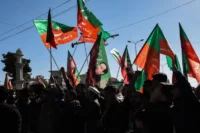
There’s Trouble Inside Pakistan’s Military
For decades, Pakistan’s military has been the country’s most vital institution. Although it frequently intervened to oust elected governments, many Pakistanis saw this as salvation from the country’s blundering politicians. The army, it was thought, was the only force capable of holding the country together.
The question now is whether the generals can keep themselves together.
The military has suffered a catastrophic loss of prestige after the populist former prime minister Imran Khan directly challenged its influence. In response, Mr. Khan was ousted, jailed and his party — despite winning the most parliamentary seats in a divisive February election — was shut out of a new civilian government that took power this month with the blessing of the military leadership.… Seguir leyendo »
